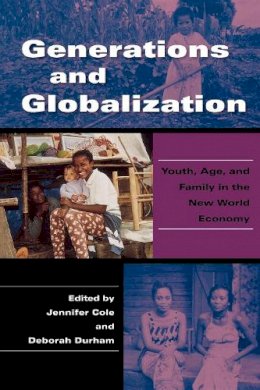
Generations and Globalization
. Ed(S): Cole, Jennifer; Durham, Deborah L.
"This volume illuminates how families and the communities in which they are enmeshed negotiate everyday lives with the social, cultural, economic, and political resources available to them. It provides an excellent example of how anthropology matters to our understanding of the contemporary world and its global restructuring." —Karen Tranberg Hansen, Northwestern University
Globalization is not only a large-scale phenomenon: it is also inextricably bound up with intimate aspects of personhood, care, and the daily decisions through which we make our lives. Looking at sub-Saharan Africa, Madagascar, Mexico, the U.S., Europe, India, and China, Generations and Globalization investigates the impact of globalization in the context of families, age groups, and intergenerational relations. The contributors offer an innovative approach that focuses on the changing dynamics between generations, rather than treating changes in childhood, youth, or old age as discrete categories. They argue that new economies and global flows do not just transform contemporary family life, but are in important ways shaped and constituted by it.
Contributors are Jennifer Cole, Deborah Durham, Jessica Greenberg, Sarah Lamb, Julie Livingston, Roger Magazine, Andrea Muehlebach, Martha Areli Ramírez Sánchez, and T. E. Woronov.
Product Details
About . Ed(S): Cole, Jennifer; Durham, Deborah L.
Reviews for Generations and Globalization
Population and Development Review
. . . [T]his collection is well worth exploring for its insights into generational shifts that occur in the midst of processes of globalization in a cross-section of countries, including two in Africa—Botswana and Madagascar.
African Studies Review
. . . well worth the read for its insightful analyses. In particular, the case studies presented throughout the book bring to life the fact that globalization does not take place 'out there.' Rather, it takes place as individuals continuously make decisions about specific relationships and through their struggle to shape livable environments in the present and future. Indeed, we are aptly reminded that it is as much in the home and in families, as in financial markets and international agreements, that the reproduction — and regeneration — of populations and societies takes place.Vol. 36.1–2, Spring/Summer, 2009
Barbara A. Mitchell, Ph.D
Dept. of Sociology/AnthropologySimon Fraser University
